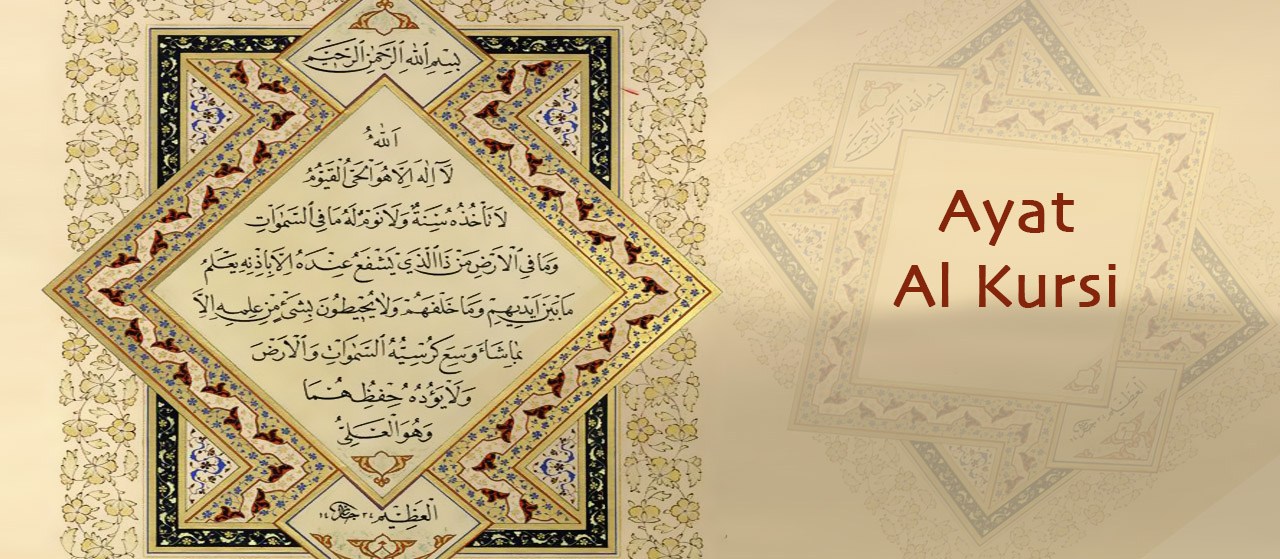﴿اللَّهُ لاَ إِلَـهَ إِلاَّ هُوَ﴾
(Allah! None has the right to be worshipped but He) mentions that Allah is the One and Only Lord of all creation.
﴿الْحَىُّ الْقَيُّومُ﴾
(Al-Hayyul-Qayyum) testifies that Allah is the Ever-Living, Who never dies, Who sustains everyone and everything. All creation stands in need of Allah and totally relies on Him, while He is the Richest, Who stands in need of nothing created.
Similarly, Allah said,
﴿وَمِنْ ءَايَـتِهِ أَن تَقُومَ السَّمَآءُ وَالاٌّرْضُ بِأَمْرِهِ﴾
(And among His signs is that the heaven and the earth stand by His command) ﴿30:25﴾.
﴿لاَ تَأْخُذُهُ سِنَةٌ وَلاَ نَوْمٌ﴾
(Neither slumber nor sleep overtakes Him) means, no shortcoming, unawareness or ignorance ever touches Allah. Rather, He is aware of, and controls what every soul earns, has perfect watch over everything, nothing escapes His knowledge, and no secret matter is secret to Him. Among His perfect attributes, is the fact that He is never affected by slumber or sleep.
Therefore, Allah’s statement,
﴿لاَ تَأْخُذُهُ سِنَةٌ﴾
(Neither slumber overtakes Him) indicates that no unawareness due to slumber ever overtakes Allah. Allah said afterwards,
﴿وَلاَ نَوْمٌ﴾
(nor sleep), which is stronger than slumber. It is recorded in the Sahih that Abu Musa said, “The Messenger of Allah delivered a speech regarding four words:
«إِنَّ الله لا يَنَامُ، وَلَا يَنْبَغِي لَهُ أَنْ يَنَامَ، يَخْفِضُ الْقِسْطَ وَيَرْفَعُهُ، يُرْفَعُ إِلَيْهِ عَمَلُ النَّهَارِ قَبْلَ عَمَلِ اللَّيْلِ، وَعَمَلُ اللَّيْلِ قَبْلَ عَمَلِ النَّهَارِ، حِجَابُهُ النُّورُ أَوِ النَّارُ لَوْ كَشَفَهُ لَأَحْرَقَتْ سُبُحَاتُ وَجْهِهِ مَا انْتَهَى إِلَيْهِ بَصَرُهُ مِنْ خَلْقِه»
(Allah does not sleep, and it does not befit His majesty that He sleeps. He lowers the scales and raises them. The deeds of the day are resurrected in front of Him before the deeds of the night, and the deeds of the night before the deeds of the day. His Veil is light, or fire, and if He removes it, the rays from His Face would burn whatever His sight reaches of His creation.)
Allah’s statement,
﴿لَّهُ مَا فِي السَّمَـوَاتِ وَمَا فِي الاٌّرْضِ﴾
(To Him belongs whatever is in the heavens and whatever is on the earth) indicates that everyone is a servant of Allah, a part of His kingdom and under His power and authority. Similarly, Allah said,
﴿إِن كُلُّ مَن فِى السَّمَـوَتِ وَالاٌّرْضِ إِلاَّ آتِى الرَّحْمَـنِ عَبْداً – لَّقَدْ أَحْصَـهُمْ وَعَدَّهُمْ عَدّاً – وَكُلُّهُمْ ءَاتِيهِ يَوْمَ الْقِيَـمَةِ فَرْداً ﴾
(There is none in the heavens and the earth but comes unto the Most Gracious (Allah) as a servant. Verily, He knows each one of them and has counted them a full counting. And every one of them will come to Him alone on the Day of Resurrection (without any helper, or protector or defender)) ﴿19:93-95﴾.
Allah’s statement,
﴿مَن ذَا الَّذِى يَشْفَعُ عِندَهُ إِلاَّ بِإِذْنِهِ﴾
(Who is he that can intercede with Him except with His permission) is similar to His statements,
﴿وَكَمْ مِّن مَّلَكٍ فِى السَّمَـوَتِ لاَ تُغْنِى شَفَـعَتُهُمْ شَيْئاً إِلاَّ مِن بَعْدِ أَن يَأْذَنَ اللَّهُ لِمَن يَشَآءُ وَيَرْضَى ﴾
(And there are many angels in the heavens, whose intercession will avail nothing except after Allah has given leave for whom He wills and is pleased with) ﴿53:26﴾, and,
﴿وَلاَ يَشْفَعُونَ إِلاَّ لِمَنِ ارْتَضَى﴾
(They cannot intercede except for him with whom He is pleased) ﴿21:28﴾.
These Ayat assert Allah’s greatness, pride, and grace, and that no one dares to intercede with Him on behalf of anyone else, except by His permission. Indeed, the Hadith about the intercession, states that the Prophet said,
«آتِي تَحْتَ الْعَرْشِ فَأَخِرُّ سَاجِدًا، فَيَدَعُنِي مَا شَاءَ اللهُ أَنْ يَدَعَنِي. ثُمَّ يُقَالُ: ارْفَعْ رَأْسَكَ، وَقُلْ تُسْمَعْ، وَاشْفَعْ تُشَفَّعْ قَالَ: فَيَحُدُّ لِي حَدًّا فَأُدْخِلُهُمُ الْجَنَّة»
(I will stand under the Throne and fall in prostration, and Allah will allow me to remain in that position as much as He wills. I will thereafter be told, “Raise your head, speak and you will be heard, intercede and your intercession will be accepted”. The Prophet then said, “He will allow me a proportion whom I will enter into Paradise.”)
Allah’s statement,
﴿يَعْلَمُ مَا بَيْنَ أَيْدِيهِمْ وَمَا خَلْفَهُمْ﴾
(He knows what happens to them (His creatures) in this world, and what will happen to them in the Hereafter) this refers to His perfect knowledge of all creation; its past, present and future. Similarly, Allah said that the angels proclaimed;
﴿وَمَا نَتَنَزَّلُ إِلاَّ بِأَمْرِ رَبِّكَ لَهُ مَا بَيْنَ أَيْدِينَا وَمَا خَلْفَنَا وَمَا بَيْنَ ذلِكَ وَمَا كَانَ رَبُّكَ نَسِيّاً ﴾
(And we (angels) descend not except by the command of your Lord (O Muhammad ). To Him belongs what is before us and what is behind us, and what is between those two, and your Lord is never forgetful) ﴿19:64﴾.
Allah’s statement,
﴿وَلاَ يُحِيطُونَ بِشَيْءٍ مِّنْ عِلْمِهِ إِلاَّ بِمَا شَآءَ﴾
(And they will never compass anything of His Knowledge except that which He wills), asserts the fact that no one attains any part of Allah’s knowledge except what Allah conveys and allows. This part of the Ayah indicates that no one ever acquires knowledge of Allah and in His Attributes, except what He conveys to them. For instance, Allah said,
﴿وَلاَ يُحِيطُونَ بِهِ عِلْماً﴾
(But they will never compass anything of His knowledge) ﴿20: 110﴾.
Allah said,
﴿وَسِعَ كُرْسِيُّهُ السَّمَـوَاتِ وَالاٌّرْضَ﴾
(His Kursi extends over the heavens and the earth.)
Waki` narrated in his Tafsir that Ibn `Abbas said, “Kursi is the footstool, and no one is able to give due consideration to ﴿Allah’s﴾ Throne.” Al-Hakim recorded this Hadith in his Mustadrak from Ibn `Abbas, who did not relate it to the Prophet. Al-Hakim said, “It is Sahih according to the criteria of the Two Sahihs, and they (Al-Bukhari and Muslim) did not record it.” In addition, Ad-Dahhak said that Ibn `Abbas said, “If the seven heavens and the seven earths were flattened and laid side by side, they would add up to the size of a ring in a desert, compared to the Kursi.”
Allah said,
﴿وَلاَ يَؤُودُهُ حِفْظُهُمَا﴾
(And He feels no fatigue in guarding and preserving them) meaning, it does not burden or cause Him fatigue to protect the heavens and earth and all that is in between them. Rather, this is an easy matter for Him. Further, Allah sustains everything, has perfect watch over everything, nothing ever escapes His knowledge and no matter is ever a secret to Him. All matters are insignificant, modest and humble before Him. He is the Most Rich, worthy of all praise. He does what He wills, and no one can ask Him about what He does, while they will be asked. He has supreme power over all things and perfect alertness concerning everything. He is the Most High, the Greatest, there is no deity worthy of worship except Him, and no Lord other than Him.
Allah’s statement,
﴿وَهُوَ الْعَلِىُّ الْعَظِيمُ﴾
(And He is the Most High, the Most Great) is similar to His statement,
﴿الْكَبِيرُ الْمُتَعَالِ﴾
(the Most Great, the Most High) ﴿13:9﴾.
These and similar Ayat and authentic Hadiths about Allah’s Attributes must be treated the way the Salaf (righteous ancestors) treated them by accepting their apparent meanings without equating them ﴿with the attributes of the creation﴾ or altering their apparent meanings.
Tafsir Ibn Kathir
Please visit our website Jannat Al Quran.



Hi there, MegaCool blog mate, I really loved this page. I’ll be sure to talk about this to my cousin who would, odds are, love to check out this post too. Found this sites post through the Bing search engine by the way, incase you were curious. Many thanks for the wonderful read!
I have read a few of the articles on your web page currently, and I like your style of blogging. I added it to my favorites blog listing and will also be checking back soon. Take a look at my site as well and let me know what you think.
Your article helped me a lot, is there any more related content? Thanks!
Keep on writing, great job!
This is really a wonderful write-up! I just have one problem.
How do you do it so brilliantly? Every little thing on this web site is
really good.
I came to your site last week and I have been checking it out on a regular basis.
You have a lots of good informative stuff on the site and i also love the particular
style of your website as well. Keep up the good work!